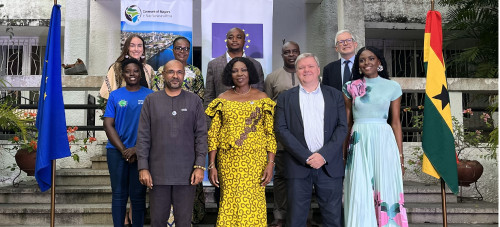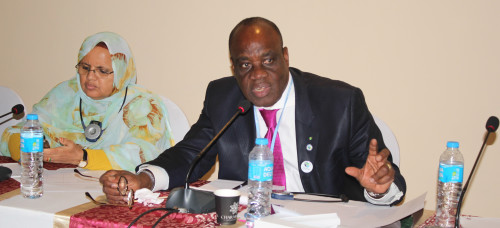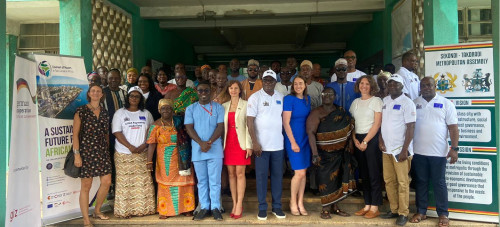In the face of unavoidable trade-offs, leveraging existing climate finance for multiple uses is key
Published: 8 Dec 2022
Climate Finance

The Covenant of Mayors in Sub-Saharan Africa (CoM SSA) Secretariat hosted a session at COP27 in the Local Governments and Municipal Authorities Constituency (LGMA) Multi-Level Action Pavilion which brought together local government leaders and finance experts to unpack the trade-offs that African city decision-makers face every day in the midst of the climate crisis.
Cities and regions are first responders to the climate emergency and their role is critical to achieving international climate targets. In order to meet this challenge, local government leaders need funding, capacity building and other resources. To communicate these urgent needs, the CoM SSA Regional Mayors Forum (RMF), on behalf of 320+ signatories presented a statement which was read by the Vice-chairperson of the RMF, Mayor of Lusaka (Zambia), Chilando Chitangala, at the start of this session.
One of the most urgent calls emerging from the statement was around ramping up finance for local governments: “…loss and damage finance is essential to protect us from the inevitable impacts of climate change. It must be new and additional to meet the needs that cities and regions are facing, and must not be reallocated from other climate or developmental priorities. Climate finance must not exacerbate the burden on cities by increasing their debt, and should be specifically allocated to sub-national governments as climate change impacts are felt at the local level.”
Read the full statement here.
Africa faces exponential climate change risks, threatening to undo developmental progress. Some cities are very exposed to slow-onset changes, such as sea level rise, while others face extreme events of increasing severity and frequency, such as floods and drought, or a combination of both. Despite the daunting challenges caused by the compounded effects of climate change and rapid urbanization, it is increasingly recognized that cities can offer solutions to curb climate change and its impacts. Such solutions are often developed as part of climate action plans that set forth strategies and targets for adaptation and/or mitigation. This can be problematic and result in trade-offs. In other words, efforts aimed at enhancing mitigation (adaptation) may hinder achieving adaptation (mitigation) objectives. Furthermore, climate impacts cause 'damage' — impacts that can be recovered from, and also 'loss' — which cannot be recovered, both of which are often not accounted for in plans and policies
David Howlett, Senior Adviser and Loss and Damage Lead, Climate Champions Team (CCT) said: “Climate loss and damage is happening now. Look at what is happening in Nigeria. Millions of people are being affected. We need to see this holistically, we can’t just do adaptation, mitigation and loss and damage. It is about getting investments into cities in order to understand loss and damage and make the city resilient, on the whole. The finance for loss and damage needs to flow now, not in 5 years’ time.”
The combination of Africa’s vulnerability to interacting polycrises, such as climate change, biodiversity loss and increasing pollution levels, with lack of resources to deal with these crises, means that every dollar spent in Africa, has to be spent wisely.
Doreen Nyanjura, Deputy Lord Mayor of Kampala (Uganda), put the spotlight on a critical issue facing her city: “Soon, more people will die from air pollution than from HIV. Over 80% of Kampala residents use wood fuel/charcoal for cooking. Kampala can no longer breathe. Kampala is one of the cities with the highest levels of air pollution.”
Low carbon development tackles issues like air pollution and many others facing African cities therefore mitigation finance is pivotal.

Overseas Development Institute (ODI) speaking.
This consideration is essential because if you have governments borrowing for mitigation projects and then putting the funds back into a facility like the Adaptation Fund or Green Climate Fund, that keeps a pool of climate finance going that can be repeatedly reinvested. We need to use existing funds in a strategic and innovative manner to accelerate climate action on the continent, instead of continuously looking for new funding sources.
Aid money should be used in tandem with climate finance to attend to cities' urgent needs for example public health, these will enhance overall resilience of the city in the face of climate impacts.
Marcus Mayr, Principle Urban Development Officer, AfDB: “Investments need to be prepared well and solidly. There needs to be a clear rationale behind investment planning. The private sector is world-class in Africa and can mobilise resources for climate change investments.”
CoM SSA signatories develop Sustainable Energy Access and Climate Action Plans (SEACAPs), a strategic and operational document which determines the local government’s baselines and offers a snapshot of how their city will look should it follow its current development track. The SEACAP process aids local governments in developing bankable projects to meet their climate targets.
Dr Abdourrahmane Maikanti, Honourable Mayor of Garoua III, Cameroon explains the importance of a SEACAP: “Planning in a collaborative and inclusive way takes more time. But it has allowed us to develop a climate plan for the whole city that is based on scientific data and on the lived experiences of our citizens. We want to strengthen our national plans and become a role model for climate governance for other local governments.”
Many CoM SSA signatories have concrete plans and have already started implementing in their cities and regions but finance is the big stumbling block. CoM SSA, with long-term support of donors has been prioritising unlocking climate finance for our signatories.
Vera Kellen, Programme Manager for Climate Change at the European Commission: “Our support to CoM SSA aims at bringing concrete benefits and making cities better for all citizens. CoM SSA is critical to anything and everything done and decided on climate change in Africa. We have increased support to CoM SSA to more than EUR 50 million and we intend to continue this support. CoM SSA is a flagship initiative of the European Commission.”
CoM SSA is co-funded by the European Union (EU), the German Federal Ministry for Economic Development and Cooperation (BMZ), and the Spanish Agency for International Development Cooperation (AECID).
Gonzalo Vega Molina, Head of Department of Cooperation in -Saharan Africa at AECID said: “Africa’s future lies in the cities within the context of overlapping crises. African cities face complex decision-making challenges every day and the most systemic challenge, climate change, cannot be left behind. Specific finance is needed quickly and must not be reallocated from other commitments.”





